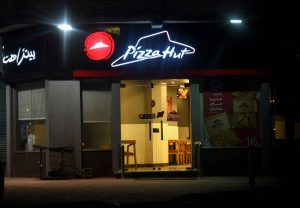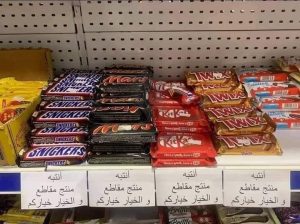Western brands struggling in some Arab countries amid boycotts
Branches of Western fast food chains in Cairo, Egypt are seen deserted due to a largely spontaneous, grassroots boycott campaign over Israel’s military vicious attacks on the Gaza Strip.
Other Western brands are feeling the impact in Egypt and Jordan, and there are signs the campaign is spreading in some other Arab countries including Kuwait and Morocco.
Participation has been uneven with only minor effects seen in Saudi Arabia -which was seen celebrating during the Riyadh Season last month amidst the attacks on Gaza – and United Arab Emirates
Some of the campaign is directed at brands which are perceived to have taken pro-Israeli stances, and some are alleged to have financial ties to Israel or investments there.
As the campaign has started to spread, boycott calls circulated on social media and have expanded to list dozens of companies and products, encouraging shoppers to shift to local products.
In Egypt, some see the boycott as the best or only way to make their voices heard, and as a solidarity with Palestine by not benefiting the economy that supports the Israeli genocide against the Palestinians.
“I feel that even if I know this will not have a massive impact on the war, then this is the least we can do as citizens of different nations so we don’t feel like our hands are covered in blood,” said 31-year-old Cairo resident Reham Hamed, who is boycotting U.S. products.


In Jordan, pro-boycott residents sometimes enter McDonald’s and Starbucks branches to encourage scarce customers to take their business elsewhere.
“No one is buying these products,” said Ahmad al-Zaro, a cashier at a large supermarket in Amman, Jordan where customers were choosing local brands instead.

Videos have circulated of what appear to be Israeli troops washing clothes with well-known detergent brands which viewers are urged to boycott.

Results in Arabian Cities
In Kuwait City on Tuesday evening, a tour of seven branches of Starbucks, McDonald’s and KFC found them almost empty.
In Rabat, Morocco, a worker at a Starbucks branch said the number of customers had fallen off significantly this week. The worker and the company gave no figures.
McDonald’s Corp said in a statement last month that it was “dismayed” by misinformation about its position on the war on Gaza and that its doors were open to all.
Its Egyptian franchise has highlighted its Egyptian ownership and pledged 20 million Egyptian pounds ($650,000) in aid to Gaza.
When asked for a statement, Starbucks pointed to an October-updated statement about its Middle East operations on its website. Rumours that the company had supported the Israeli government or army were refuted in the statement, which described the company as a non-political organisation.
Starbucks said it had nothing more to say about its business after revealing record revenues for the fourth quarter earlier this month.
The protests reflect waves of anger over the Israeli military attacks on Gaza, causing a humanitarian crisis and killing more than 13,300 Palestinians.
THE IMPACT OF BOYCOTTING
Previous boycott campaigns in Egypt had less impact, including those advocated by the Palestinian-led Boycott, Divestment, Sanctions (BDS) movement.
“The scale of the aggression against the Gaza strip is unprecedented. Therefore, the reaction, whether on the Arab street or even internationally, is unprecedented,” said Hossam Mahmoud, a member of BDS Egypt.
Some campaigners have singled out Starbucks for suing its workers’ union over a post on the Israeli war on Gaza, and McDonald’s after its Israeli franchise said it gave free meals to Israeli military personnel.
An employee at McDonald’s corporate offices in Egypt who asked not to be named said the Egyptian franchise’s October and November sales fell by at least 70 percent compared to the same months last year.
“We are struggling to cover our own expenses during this time,” the employee said. Reuters was not immediately able to verify the figures the employee provided.
Sameh El Sadat, an Egyptian politician and co-founder of TBS Holding, a supplier to Starbucks and McDonald’s, said he had noticed a drop or slowdown of about 50 percent in demand from his clients.
UNEXPECTED RESULTS
Boycott campaigns have gained traction despite attempts by targeted brands to defend themselves and keep business with exclusive deals.
In certain cases, these campaigns have even spread outside of the Arab world.
An employee at a McDonald’s in Putrajaya, the administrative capital of Muslim-majority Malaysia, claimed that the restaurant was seeing 20 percent fewer patrons. Reuters reported (number unverified)
Ride-hailing app Grab also faced boycott calls in Malaysia after the chief executive’s wife said she had fallen “completely in love” with Israel during visits there. She later said the posts were taken out of context.
The Malaysian arms of Grab and McDonald’s said following the boycott calls that they would donate aid for Palestinians.
Earlier this month, the Turkish parliament banned Nestle and Coca-Cola products from its restaurants, citing a “public outcry” against the companies, despite the fact that no significant Turkish business or government organisation had severed its connections with Israel.
Take-up of boycotts has been uneven, with almost little to no impact seen in some countries including Saudi Arabia, the United Arab Emirates, and Tunisia.


